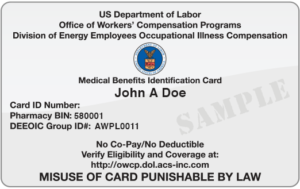Although both EEOICPA and RECA offer compensation to those who contracted serious illnesses as a result of exposure to radiation, each only covers specific individuals and both require a different filing process. Those who qualify for benefits may be eligible to receive covered medical expenses, including home health care, so if you have questions about what types of medical costs are covered, it is critical to contact an experienced home care professional who can describe its services and conditions. <
Filing for EEOICPA Benefits
Only current or former Department of Energy (DOE) workers are eligible for benefits under EEOICPA. To find out if they have a claim, potential claimants must submit an in-depth record of employment history as well as medical evidence of a diagnosis in addition to an official claim form. Surviving spouses who file a claim must also include a marriage certificate, while surviving children will be required to include a birth certificate.
The Division of Energy Employees Occupational Illness Compensation (DEEOIC) has made the necessary forms available online. Once completed, claimants must mail the forms to the DOL DEEOIC Central Mail Room in London, Kentucky. Claimants who have questions about the forms or the evidence necessary to establish a claim have the option of contacting one of the eleven Resource Centers located across the nation. These Resources Centers can help claimants complete and submit forms and transmit documents to the DEEOIC.
Filing a RECA Claim
To file a RECA claim, the claimant must fall under one of five claimant categories, which include:
- Uranium millers
- Uranium miners
- Ore transporters
- Those who lived downwind from a nuclear testing site
- Onsite participants
Surviving spouses, children, and grandchildren of an eligible claimant may also file on that person’s behalf. Besides completing the appropriate forms, claimants must also submit supporting documentation, including the claimant’s or survivor’s:
- Birth certificate
- Marriage certificate
- Death certificate
- Divorce decree
The claimant must also submit proof of his or her presence in an affected area during a designated time period, which could include certified or original copies of the following types of documents:
- Tax records
- School records
- Employment records
- Birth and marriage records
- Personal letters or envelopes
- Religious records
- Voting records
- Personal diaries
Finally, the claimant must certify that he or she, or a parent, spouse, or grandparent suffered from one of a list of specific cancers by submitting medical records, which could include:
- A pathology report of tissue biopsy
- An operative report
- A hospital discharge summary report
- A physician’s summary report
- A death certificate, dated and signed by a physician
- An autopsy report
Once completed, the form must be sent to the Radiation Exposure Compensation Program in Washington D.C.
Contact a Home Care Professional Today
Many claimants who suffer from illnesses caused by radiation or exposure to toxins require a substantial amount of help with daily activities, such as eating, washing, dressing, and walking. Fortunately, eligible parties under EEOICPA, are entitled to these services free of charge. If you are concerned about a loved one’s well-being and ability to care for him or herself, please contact us at United Energy Workers Healthcare and Four Corners Health Care today.
Who We Serve
Do you have this card?

If you already have this card, then you are already approved to receive no-cost medical benefits! Call us to get started today.
In order to be eligible for EEOICPA/RECA benefits, an individual must have been employed at a covered Department of Energy facility, an approved atomic weapons facility, or at a permitted beryllium vendor. An individual must also have one of the covered conditions as a result of exposure to radiation, beryllium, or silica while employed at an accepted facility. In addition, uranium miners, millers, and ore transporters are eligible for benefits if they develop an illness as a result of exposure to toxic substances (such as radiation, chemicals, solvents, acids, and metals) and worked at a facility covered under RECA. Eligibility requirements vary by location and condition.